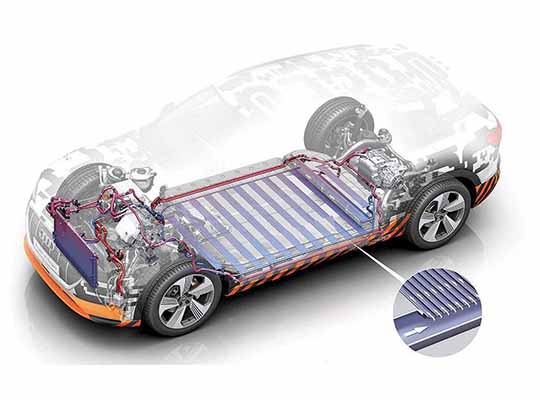REDDING, Calif. : According to a new market research report titled, ‘EV Battery Management Systems Market by Vehicle Type (Electric Cars, LCV, HCV, E-scooters & Motorcycles, and E-bikes), Configuration, Design, Topology, Voltage, Cell Balancing Method, and Geography – Global Forecast to 2029,’ the EV battery management market is projected to reach $37.3 billion by 2029, at a CAGR of 30.5% from 2022 to 2029.
A battery management system in an electric vehicle manages a rechargeable battery to ensure it operates safely and efficiently. BMS is designed to monitor the parameters associated with the battery pack and its cells, apply the collected data to eliminate safety risks and optimize battery performance.
The growth of this market is attributed to the increasing adoption of electric vehicles, the increasing safety concerns related to EV batteries, the increasing demand for fast charging batteries for e-mobility, and the increasing requirement for higher efficiency and performance of battery packs. However, the lack of standardized regulations for developing battery management systems and the high cost of battery management systems are expected to restrain the growth of this market. Furthermore, the increasing R&D investments for developing high energy density EV batteries and new cell chemistries for EV batteries offer potential growth opportunities for the players operating in this market.
Growing Demand for Fast-charging Batteries for E-mobility is Driving the Growth of the EV Battery Management Market
The demand for fast-charging batteries is increasing with the world’s gradual shift toward electric mobility. While many different types of batteries are available in the market, fast-charging batteries are becoming increasingly popular due to their many benefits.
Leading companies are focusing on investing in fast-charging infrastructure, in turn boosting the demand for fast-charging batteries. For instance, in 2022, BP p.l.c. (U.K.) and Iberdrola, S.A. (Spain) collaborated to invest USD 1 billion in rolling out a network of up to 11,000 rapid and ultra-fast public charging points across Spain and Portugal. The collaboration aims to install 5,000 fast-charge points by 2025 and the full network by 2030, including BP and Iberdrola’s existing and future fast charging hubs. This rapid growth in fast-charging infrastructure supports the demand for EV battery management systems.
Increasing government subsidies and active infrastructure development by public utilities are contributing to the rapid deployment of fast public charging infrastructure worldwide. According to the Global EV Outlook 2022 report published by the International Energy Agency (IEA), in 2021, fast-charging installations in China reached 470,000, an increase of over 50% from 2020. In addition, the number of public fast chargers in Europe was up by over 30% (nearly 50,000 units), including 9,200 public fast chargers in Germany, 7,700 in the U.K., 6,700 in Norway, 4,500 in France, 2,600 in Spain, and 2,600 in the Netherlands. The U.S. has about 22,000 fast chargers, of which nearly 60% are Tesla superchargers. Korea has 15,000 fast chargers, a 50% increase from 2020.
Thus, the increasing deployment of fast-charging points has boosted the demand for fast-charging batteries, which is expected to drive the demand for EV battery management systems in the coming years.
The EV battery management systems market is segmented by vehicle type, configuration, design, topology, voltage, cell balancing method, and geography. The study also evaluates industry competitors and analyzes the market at regional and country levels.
Based on configuration, in 2022, the 96 to 132 cells segment is expected to account for the largest share of the EV battery management systems market. The large market share of this segment is attributed to the optimum weight to the power capacity of the battery pack, the increasing use of 96 cells to 132 cells in electric passenger cars, and the increasing lightweight battery packs with a high energy density trend.
Based on design, in 2022, the battery management systems segment is expected to account for the larger share of the EV battery management systems market. The large market share of this segment is attributed to the ability of the battery management systems to monitor the voltage and current in a battery pack, its cell balancing capabilities, and the ability to protect against overcharge and deep discharge.
Based on topology, in 2022, the modular BMS segment is expected to account for the largest share of the EV battery management systems market. It is the most preferred topology by battery manufacturers, offers significant computational power, and is safe as it does not require extensive wire harnesses. These factors are driving the growth of this segment.
Based on geography, in 2022, Asia-Pacific is expected to account for the largest share of the EV battery management systems market. The presence of prominent players in the EV battery management systems market is expected to contribute to this region’s high revenue share. Additionally, the large share of this regional market is also attributed to the increasing investment by leading battery OMEs for setting up battery manufacturing capacities in emerging economies such as Thailand, Indonesia, and India and the growing number of start-ups offering numerous battery solutions.
The key players operating in the EV battery management market are Leclanché SA (Switzerland), Sensata Technologies Holding PLC (U.S.), Nuvation Energy (U.S.), Renesas Electronics Corporation (Japan), Eberspaecher Vecture Inc. (Canada), ST Microelectronics N.V. (Switzerland), Panasonic Corporation (Japan), LION Smart GmbH (Germany), Ewert Energy Systems, Inc. (U.S.), Navitas Systems LLC. (U.S.), NXP Semiconductors N.V. (Netherlands), Analog Devices, Inc. (U.S.), Merlin Equipment Ltd. (UK), BMS PowerSafe (France), and Maxim Integrated (U.S.).
Scope of the Report:
EV Battery Management System Market, by Vehicle Type
- Electric Cars
- Battery Electric Vehicles
- Plug-in Hybrid Electric Vehicles
- Hybrid Electric Vehicles
- Light Commercial Vehicles
- Heavy Commercial Vehicles
- E-scooters & Motorcycles
- E-bikes
EV Battery Management System Market, by Configuration
- Up to 36 Cells
- 48 Cells to 84 Cells
- 96 Cells to 108 Cells
- 144 Cells to 180 Cells
- More Than 180 Cells
EV Battery Management System Market, by Design
- Protection Circuit Model
- Battery Management Systems
EV Battery Management System Market, by Topology
- Centralized BMS
- De-centralized BMS
- Modular BMS
EV Battery Management System Market, by Voltage
- Low-voltage BMS
- High-voltage BMS
EV Battery Management System Market, by Cell Balancing Method
- Active Cell Balancing
- Passive Cell Balancing
EV Battery Management System Market, by Geography
- Asia-Pacific
- China
- India
- Japan
- South Korea
- Thailand
- Indonesia
- Rest of Asia-Pacific
- Europe
- U.K.
- Germany
- France
- Italy
- Spain
- Poland
- Hungary
- Norway
- Sweden
- Denmark
- Rest of Europe
- North America
- U.S.
- Canada
- Latin America
- Middle East & Africa











